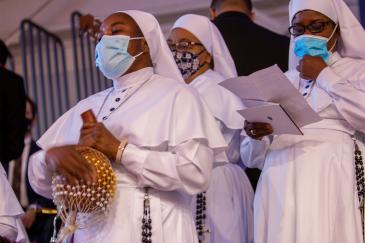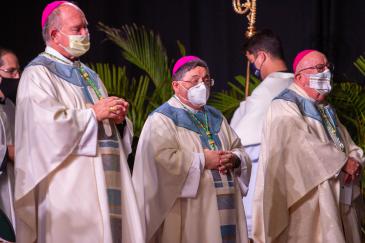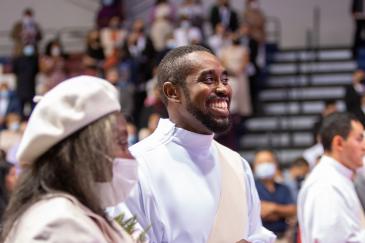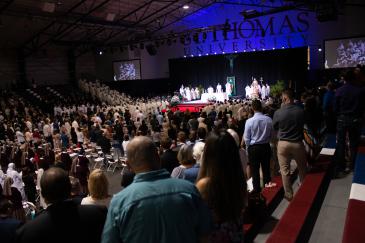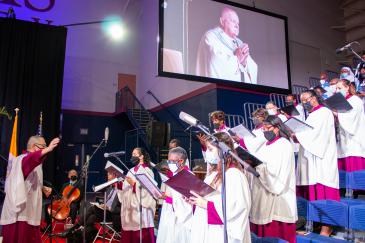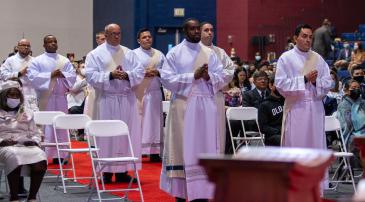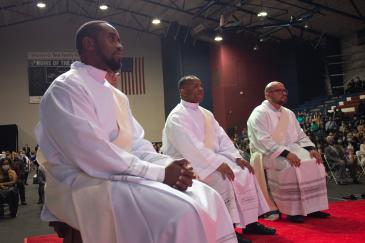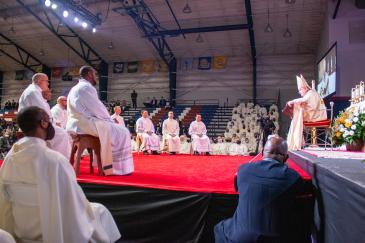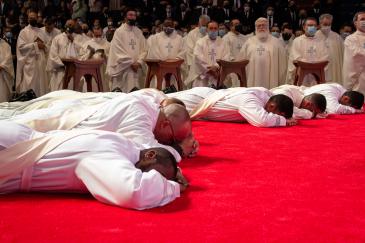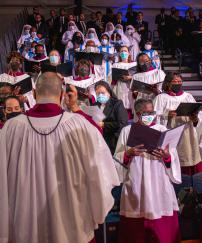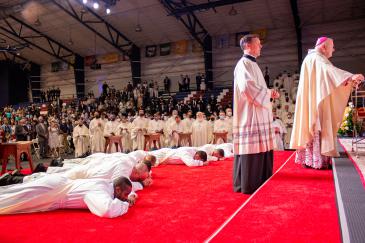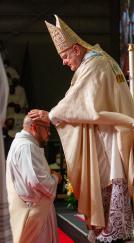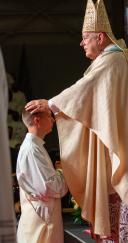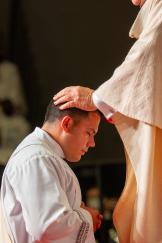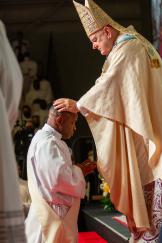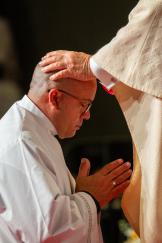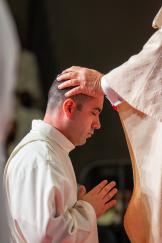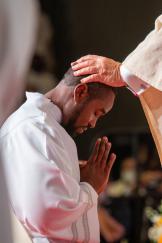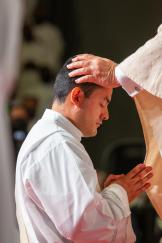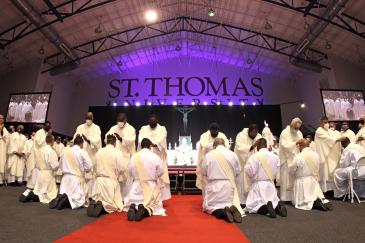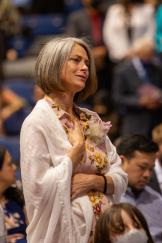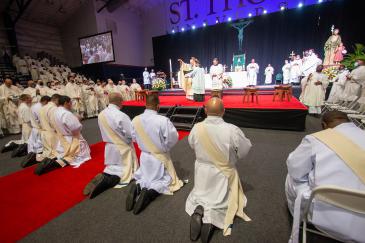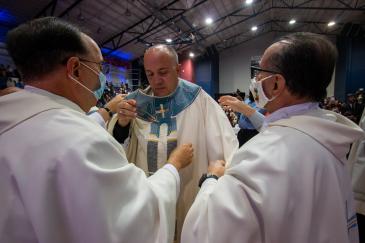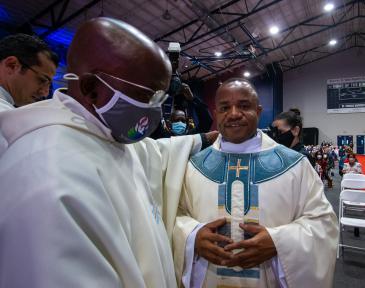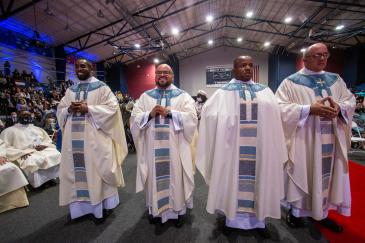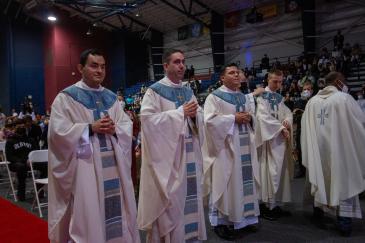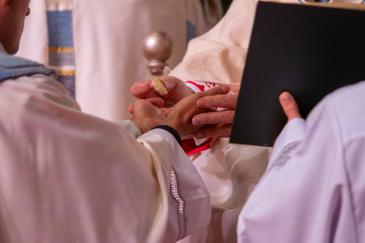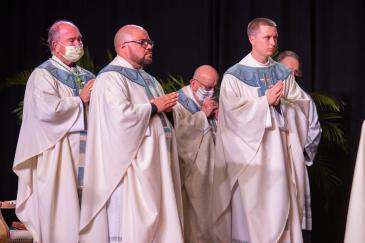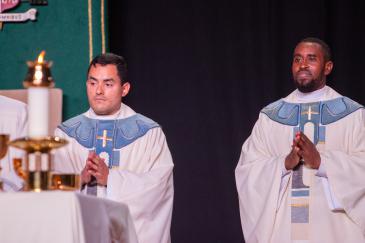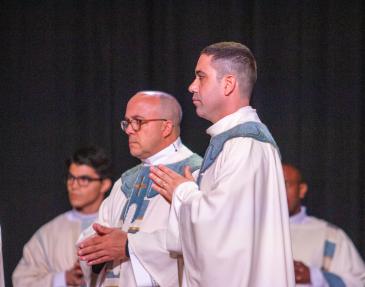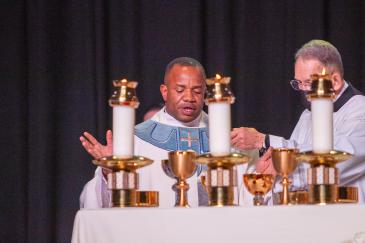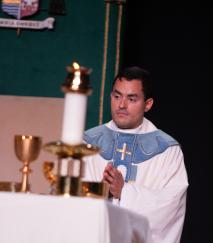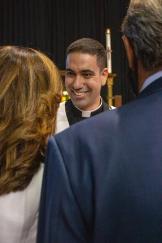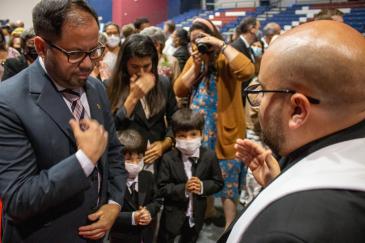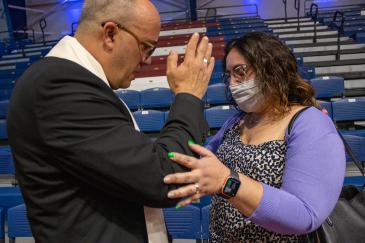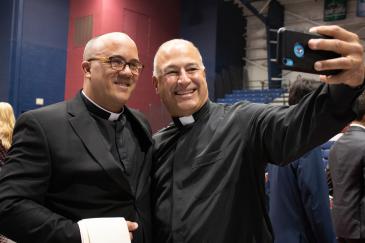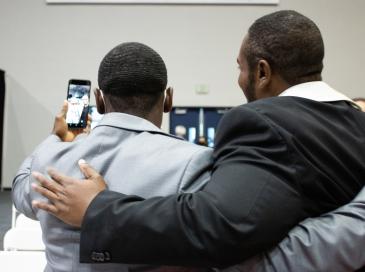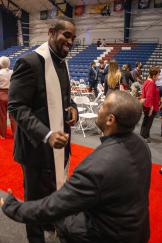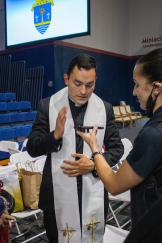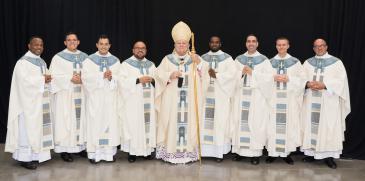By Ana Rodriguez Soto - The Archdiocese of Miami
Photography: ANA RODRIGUEZ-SOTO | FC
MIAMI | Nigerian nuns sang in Igbo. A Brazilian woman did it in Portuguese. The choir sang in Spanish and Creole. The congregation prayed the Our Father in Latin, and the Kyrie, of course, in Greek.
All in the same Mass, where Archbishop Thomas Wenski ordained eight men to the archdiocesan priesthood. The diversity of tongues matched the diversity of the new priests: Three are home-grown, two born and raised in Miami, the third in Fort Lauderdale — one to Nicaraguan parents, the other to Cuban and Chilean parents, the third to Haitian parents. Another comes from Nigeria, the second native of that country to be ordained for Miami. Three more come from Hawaii, Brazil and Paraguay – the first archdiocesan priests from those places. And the eighth comes from Cuba.
So many new priests, in fact, that the ordination ceremony, celebrated May 8, 2021, was moved from St. Mary Cathedral to the Fernandez Family Center at St. Thomas University, to accommodate the nearly 800 people who attended while still adhering to pandemic guidelines for social distancing.
The pictures on these pages tell the story of the ordination Mass. Below are the stories of those ordained. More basic biographical information can be found here.
Father Yosbany Alfonso: ‘Something I couldn’t control’
A member of Cuba’s “Y” generation — so-called because their first names begin with that letter, unusual in Spanish — Father Alfonso, 48, was raised Catholic but not practicing. Going to church was not the thing to do in an officially communist and atheist nation.
But at 14, he recalled, “I felt the desire to go to church. It impacted me greatly.” Baptized at 15, confirmed at 18, he had been impressed by the example of his ever-present, ever-giving parish priest. “I began to fall in love with the priesthood.”
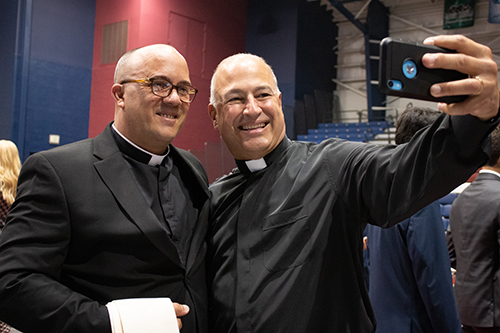
Photographer: ANA RODRIGUEZ-SOTO | FC
Father Elkin Sierra, right, takes a selfie with newly ordained Father Yosbany Alfonso after the ceremony.
But he didn’t have much time to discern. At 26, he arrived in the U.S. alone and got to work: first as a chef’s assistant at the University of Miami’s Faculty Club, then as a barber and massage therapist. Although he continued attending Mass faithfully, he was focused on one goal: bringing his mom, stepfather and younger brother to Miami.
Having done that, he figured he could start living more for himself, and made plans to move to New York. But something happened during Mass on the feast of Pentecost 2012. As St. Brendan’s pastor, Father Fernando Hería (now rector of the National Shrine of Our Lady of Charity), invoked the Holy Spirit, “I began to cry. I began to feel something, and I saw myself reflected in him,” Father Alfonso said. That “tremendous desire” for the priesthood that he had experienced as a young adult returned. “I said, Lord, not now. But it was something I couldn’t control.”
He met with Father David Zirilli, then the archdiocesan vocations director, and told him flat out: “I want to be sure that God isn’t calling me.”
After nearly a year of discernment, he entered the seminary in August 2013. “God grabbed me by the leg,” Father Alfonso said.
When he told his mother, Olga Zamora, he says she replied: “You took too long. She knew, from the time we lived in Cuba, that something had happened.”
Father Hans Chamorro: A ‘gift from the Lord’
Viviana Chamorro almost had two sons become priests. Her youngest, Ion, discerned out of the seminary and is now serving his country in the U.S. Army. Hans, 31, the sixth of seven brothers, all but two of whom live in Nicaragua, took a little longer to decide, working as an advertising copywriter for a couple of years before entering the seminary.
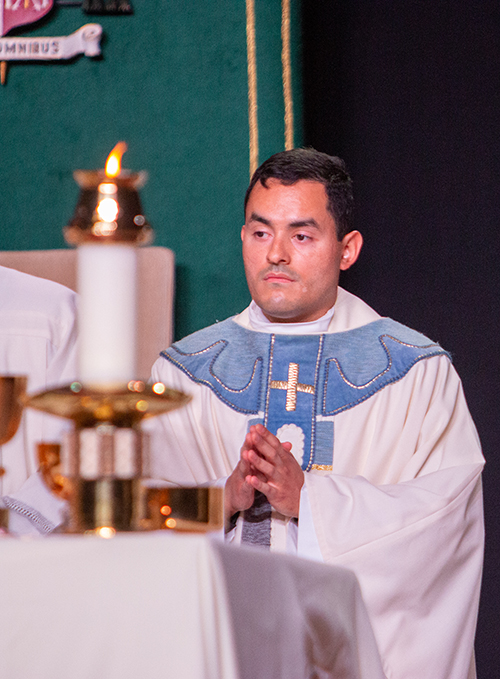
Photographer: ANA RODRIGUEZ-SOTO | FC
Newly ordained Fathers Hans Chamorro concelebrates the Mass where Archbishop Thomas Wenski ordained him and seven others as new priests for the Archdiocese of Miami, May 8, 2021.
Now that he’s a priest, his mother looks back and sees the hand of God. Hans is the one she “offered to the Lord,” she said — because doctors had advised her to abort him. Her husband, Juan, had been undergoing chemotherapy when she got pregnant. The doctors told her the child could be born with deformities. “And I said, I want him, regardless,” Chamorro recalled.
His vocation was not clear at first. Although he “grew up in the Church,” he said, he attended public school and graduated from Florida International University with an English degree. Having found work in his field, “I started to have this moment when I wanted to feel fulfilled,” he recalled. “I was asking, does God want more of me? I felt him answer, priesthood. That was very frightening.”
Why? Because “I’m not cut out for this,” he thought. “I don’t have the talents that I need.”
His pastor at St. Michael the Archangel, Father Christopher Marino (now rector at St. Mary Cathedral), had asked him at 18 if he had considered the priesthood. “I had, but not very seriously,” Father Chamorro told him. He was still a teenager and looking forward to dating, marriage and a family.
But after hearing God’s call, attending holy hours, talking to priest friends, “that made me kind of turn to the Lord more. Find my strength in him,” Father Chamorro said.
Having spent his deaconate year in the “bubble” of St. Vincent de Paul Seminary in Boynton Beach, unable to serve at a parish on weekends, he understands how the pandemic has made people lose touch with their families and the Church.
“There’s a lot of pain, many wounds that I would like to help heal in the name of Christ,” Father Chamorro said. He wants to be a priest “who reminds the people that God has not abandoned them.”
As for his mother, she could only watch his ordination in amazement. “Look how the Lord never tells us no,” she said. “Look at the gift the Lord has given me.”
Father Alberto Chavez: ‘Leaving behind success’
As the youngest of three sons, Father Chavez admits, “I’m the spoiled one; very, very spoiled.”
A native of Paraguay, he was baptized but not raised in the faith. His parents and siblings were all involved in law enforcement, and the family had an active social life — no time for church on weekends.
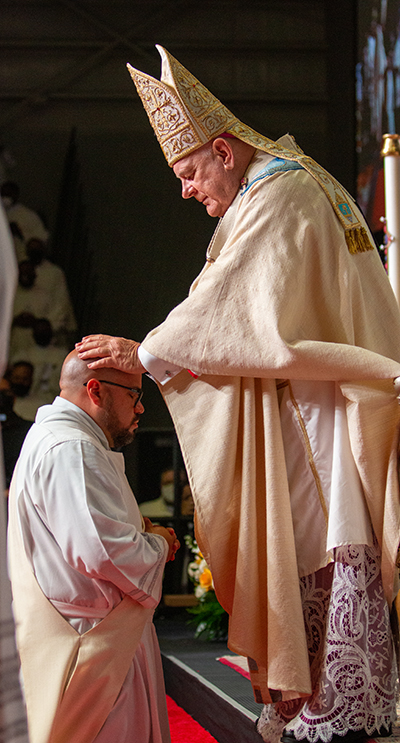
Photographer: ANA RODRIGUEZ-SOTO | FC
Archbishop Thomas Wenski lays hands on Deacon Alberto Chavez, ordaining him as one of eight new priests for the Archdiocese of Miami, May 8, 2021.
Then his father died suddenly when Alberto was 15, and he fell into “a deep, deep darkness” — fights with his family, no purpose in life. Until he joined the Neocatechumenal Way, an ongoing formation that “leads people to fraternal communion and mature faith.”
“There I discovered that I have a mother, which is the Church, and I have a Father, who’s alive. And being alive, he took good care of me. He gave me the backbone that I needed to pull myself together,” said Father Chavez.
The call to priesthood came at the same time. But he was determined to become a lawyer like his father, a goal he reached at 23. “And I was a successful lawyer. But I was empty.”
He practiced financial law, and had been promoted four times in three months, when he was invited to attend a Neocatechumenal seminary in Italy. To do so, he had to turn down another promotion.
“This was a trial. I realized in that moment that my calling to the priesthood was serious, because I was leaving behind success,” recalled Father Chavez, now 33. But he recognized, “I need to try this. This is too heavy inside me.” Also, “this call never ends.”
Following the will of God, he spent three years as a missionary with Neocatechumenal communities in Brownsville, Texas, Tulsa, Oklahoma and Chicago, Illinois. He finally wound up in Miami in 2011, as one of the 12 founding members of Redemptoris Mater Archdiocesan Missionary Seminary in Hialeah. He and Father Paul Pierce are the first two from that seminary who have received all their formation in the archdiocese.
His mother, Luisa Godoy, was “extremely sad” at first, he recalled. Not only was he leaving the law to become a priest, but he was also leaving his family in Paraguay.
“Very far” from home, she said as she waited for the ordination Mass to begin. “I wasn’t expecting it.” But that sadness has dissipated as she sees her son. “He is very happy.”
Father Franklin Ekezie: A greeting in Igbo
“My life has been in the seminary. This is who I am,” said Father Ekezie, 39. He entered at 12 in his native Nigeria shortly after his beloved grandmother died. He was preparing for first Communion and had been taught that if he wanted to see his loved ones again, he could do so in heaven. But he could only get to heaven if he behaved well and listened to the teaching of the priest.
He thought: “I want to see my grandmum again. So instead of listening to the priest, why don’t I become a priest?”
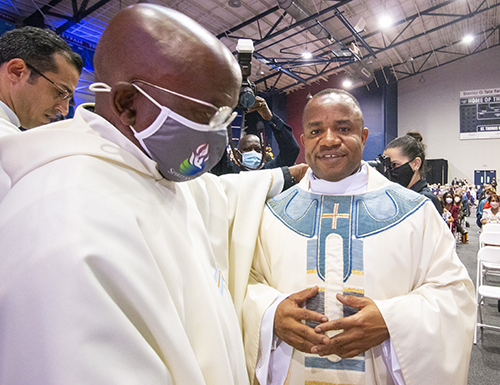
Photographer: ANA RODRIGUEZ-SOTO | FC
Newly ordained Father Franklin Ekezie wears his priestly vestments after being vested by a fellow Nigerian who welcomed him into his parish, Father Samuel Muodiaju, left, pastor of St. Monica in Miami Gardens.
Near the end of his formation, having earned his bachelor’s degree in theology, he began to doubt. Was seeing his grandmother again a good enough reason to be a priest? He left the seminary and set off for the U.S., where he expected to study some more before returning to Nigeria. He wound up in Florida, at St. Leo University, where he planned to get a master’s in theology to later teach.
Gravitating to the familiar, “I used to hang out with the (Benedictine) brothers there,” he recalled. They were disappointed when he told them he didn’t want to join their community. But they suggested he might feel more at home in multicultural Miami.
He caught a Greyhound bus in Tampa and arrived in Fort Lauderdale at 4:30 a.m. Tired and sleepy, he Googled the nearest Nigerian community. It turned out to be St. Monica in Miami Gardens, whose pastor, Spiritan Father Samuel Muodiaju, is not only Nigerian but “even from my tribe,” Father Ekezie said. “He welcomed me, gave me a room to relax before (morning) Mass” and eventually introduced him to a woman who turned out to be his mother’s cousin. “She knew me when I was little.”
By 2016, he had moved here and joined St. Bernard Parish in Sunrise, where an even bigger surprise awaited him. Archbishop Wenski came to celebrate a confirmation and greeted him in Igbo. “Kedu?” he asked him, which means, how are you? “Imana bekee n’ásu Igbo?” the archbishop continued: Do you know that white man speaks your language?
“I think, with this greeting from archbishop, my body and spirit belong here,” said Father Ekezie, 39. “If the archbishop can greet me and welcome me in my language, what else am I looking for?”
Back in Nigeria, on the verge of ordination, he had told God, “My Lord, I want to think about this before I go into it. So after thinking about it, I found my way.”
Father Jeremy Lully: Mom’s dream comes true
His mother made him do it. When he was around 12, Carmelle Louis forced her third child and his four younger sisters to become altar servers at Divine Mercy Haitian Mission, part of St. Clement Parish in Fort Lauderdale. “I didn’t want to do any of this but I knew I couldn’t disobey mom,” said Father Lully, 30.
For a while, he got away with not serving, finding an excuse at every turn. But when he finally did it, “I really fell in love with altar serving. It was just a beautiful way of assisting the Mass, learning about the Mass, and getting closer to Jesus,” he said.
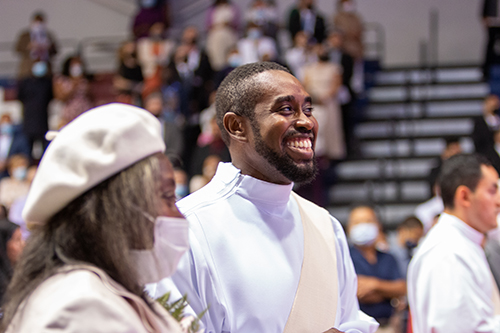
Photographer: ANA RODRIGUEZ-SOTO | FC
Deacon Jeremy Lully flashes a big smile at the start of the Mass. Next to him is his mother, Carmelle Lully. Archbishop Thomas Wenski ordained eight new priests for the Archdiocese of Miami in a moving ceremony May 8, 2021. The ordination took place at St. Thomas University's Fernandez Family Center in order to accommodate the nearly 800 in attendance while adhering to pandemic safety protocols.
He got involved in religious education and other parish ministries, but priesthood wasn’t in his plans. He got a degree in urban planning and an internship with the city of Fort Lauderdale that would have turned into a paid position after graduation from Florida Atlantic University in Boca Raton.
“Many parishioners saw it in me before I saw it in myself,” Father Lully said. They would say, “You look like a priest.” And he would reply, no thanks, “I can be a good and holy person this way. But that wouldn’t die away.”
He met with Father Zirilli, then the vocations director, who assured him that “it’s not an all-in deal. You enter. You discern ... Give it two years.”
“There were ups and downs and there were doubts at times of, does God really want me to do this, should I really be here? But nothing really said that I should leave,” Father Lully recalled. “And I just kept growing in my love for God and wanting to help people love God.”
His priestly philosophy: “Do small things with great love. I think that’s how we can change the world. If I can be a priest that does that, I’ll thank God for that.”
His mother has been thanking God for a while now. “I was always asking God for one of my children to be a priest,” she said, her eyes moist with tears, before his ordination. “This is a grace. It’s a blessing. My dream come true.”
Father Paul Pierce: From ‘none’ to priest
Baptized at 19, Jesse Adam Pierce now goes by the name he chose: Paul. Like the apostle to the Gentiles.
Fitting, because “I was nothing from the beginning. My dad never spoke to me about God. Neither did my mom,” said the 31-year-old native of Hawaii, an only son of parents who divorced when he was four. (He now has a half-sister, age 12.)
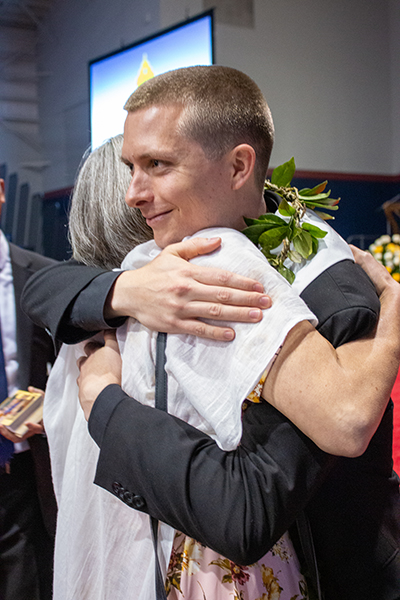
Photographer: ANA RODRIGUEZ-SOTO | FC
Wearing a Hawaiian style lei, newly ordained Father Paul Pierce hugs his mother, Rachel Hope, after the ceremony.
His mother, Rachel Hope Pierce, “was looking everywhere,” he said, experimenting with all kinds of belief systems, from Hinduism to New Age.
“I was raised anti-Christian, pagan really,” she said. Then her yoga teacher pointed her to the Neocatechumenal Way, which her son describes as a “post baptismal catechumenate,” although in their case it was pre-baptismal.
His mom was baptized first, when he was around 13. A year later, she invited him to join her Neocatechumenal community. “I wanted him to have better than what our family had – chaos and suffering,” she said.
“I went just to please my mom,” he admitted. Within a few years, the community “became like a second family.”
“I saw signs in the community I never saw in my family,” Father Pierce recalled. “The love, the unity among them is something I didn’t see anywhere else, not even my parents.”
He volunteered to go on mission, first to Minnesota, then to North Dakota and eventually New Mexico. Gradually, his calling became clear. “I knew that to do the will of God would be my happiness,” he said. “Somehow the Lord gave me that grace, to trust him. And he has not disappointed.”
His dad remains an agnostic, not understanding his vocation but not opposing it either, Father Pierce said.
“He has peace and joy,” Rachel Hope Pierce said of her son. “Everything a mother wanted, he found. It’s an answered prayer.”
Father Leandro Siqueira: ‘The heart of a father’
Perhaps it’s appropriate that Father Siqueira, 36, was ordained in the Year of St. Joseph. Woodworking is his passion. “In my free time I still do that. It’s like a hobby. I don’t want to divorce this from my life as a priest,” he said.
It began when he moved to the U.S. at 17, armed with a high school degree from his native Brazil and a youthful desire for “a new experience.” His older sister, Lorena, had come a couple of years earlier. He joined her in Massachusetts and began working, often as many as 14 or 15 hours a day. “I did many things, mainly construction, painting, bricklaying. Once I found carpentry, I fell in love with it.”
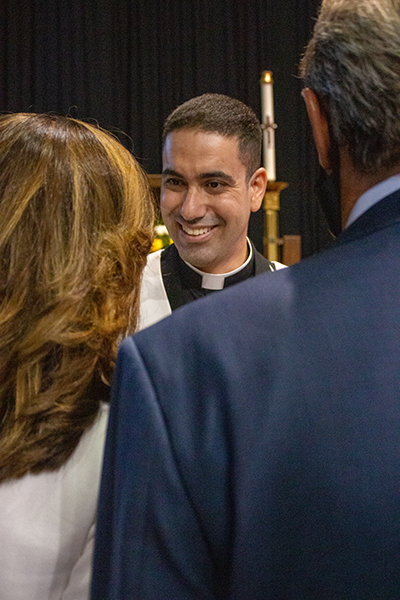
Photographer: ANA RODRIGUEZ-SOTO | FC
Newly ordained Father Leandro Siqueira is greeted by well wishers after the ceremony.
He lived in Massachusetts for three years before moving to Florida in 2005. He found a job doing “very expensive and specialized woodworking.” His younger brother, Bruno, eventually joined him and they began working together.
They also entered the seminary together, although his brother discerned out after three years. He credits the Brazilian community at his home parish, St. Vincent in Margate, and "a couple of priests I found along the way. They got me closer to the Eucharist because they invited me to serve Mass.”
Father Siqueira had made his first Communion and confirmation at age 10. But he did not start serving at Mass until he was 21. At 23, he remembers feeling the desire to be a priest “but I didn’t want to hear because I was dating.” In fact, he was considering marriage. He and his brother had opened a small business and were doing well financially.
“Then the Lord called and I said, Lord, can you call someone else?” Father Siqueira recalled. He decided to give God “one year of my life. I was afraid to get old and ask, what if. I did not want to die with the what if.”
Now, he sees that “the Lord is fulfilling his greatest desire for me, but also my greatest desire, which is to be a husband and a father. That’s the joy of my vocation. To become a father. Now after (ordination) I will be a husband, I will have the Church as my wife, to protect and to care for. And I will have the children.”
“Leo always had a great heart,” said his brother Bruno at the ordination Mass. “We never doubted his vocation once he started thinking about it seriously. He has the heart of a father.”
Father Nicholas Toledo: ‘It’s like being Christ, right?’
After attending a Mass at the age of 9, Nicholas Toledo told his aunt he wanted to be a priest. “She kinda said think about it harder,” he recalled.
His vocation made sense. He had grown up “surrounded” by faith at Mother of Christ in Miami, where his father, Roberto Toledo, had founded a movement called Escoge, geared toward teenagers.
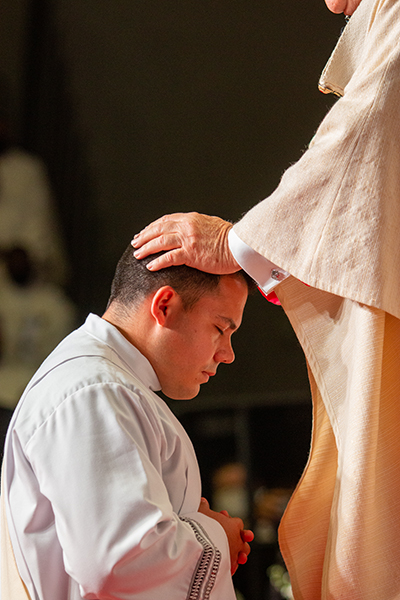
Photographer: ANA RODRIGUEZ-SOTO | FC
Archbishop Thomas Wenski lays hands on Deacon Nicholas Toledo, ordaining him as one of eight new priests for the Archdiocese of Miami, May 8, 2021.
Yet despite spending a lot of time in church, there were times when Nicholas tried to fake being sick to get out of going to Mass. “In a sense, I was surrounded by the Church and in another sense, I didn’t want to be a part of it that much.”
That is until his sophomore year in high school, when he attended an Escoge retreat, and afterwards joined the youth group — partly for the “good-looking girls” and the “cool people” he met there, he admits. Nevertheless, “it was then that I started going to church every week, going to the Blessed Sacrament and praying.”
Then, sometime in his junior year, a woman came up to him and asked him if he planned on being a priest. “Definitely not,” he replied. “But the question stayed there.”
God had planted the seed. He decided to enter the seminary right after high school, just “to see what the priesthood had in store.”
At 27, he doesn’t have all the answers. But he recalled the summer he and two other seminarians spent helping at the Missionaries of Charity shelter in Miami. “They always told us, you have to be a holy priest. If you’re not a holy priest, leave the seminary right now.”
But he never asked what such holiness requires. His answer, so far: “The priest is called to be a man of unity, a man of prayer, a man of compassion, of mercy, a man of forgiveness, a man of service. So it’s like being Christ, right? I want to be a priest that’s willing to share the love that was shared with me.”
His mother, Gema Toledo, said his age will be an advantage. “He’s going to have a very special connection with the youth. Isn’t that what the world needs?”
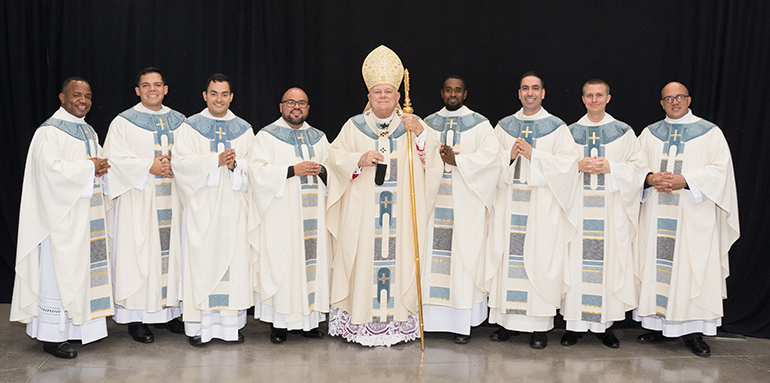
Photographer: TOM TRACY | FC
Newly ordained priests take the official photo. From left: Father Franklin Ekezie, Father Nicholas Toledo, Father Hans Chamorro, Father Alberto Chavez, Archbishop Thomas Wenski, Father Jeremy Lully, Father Leandro Siqueira, Father Paul Pierce, and Father Yosbany Alfonso.

